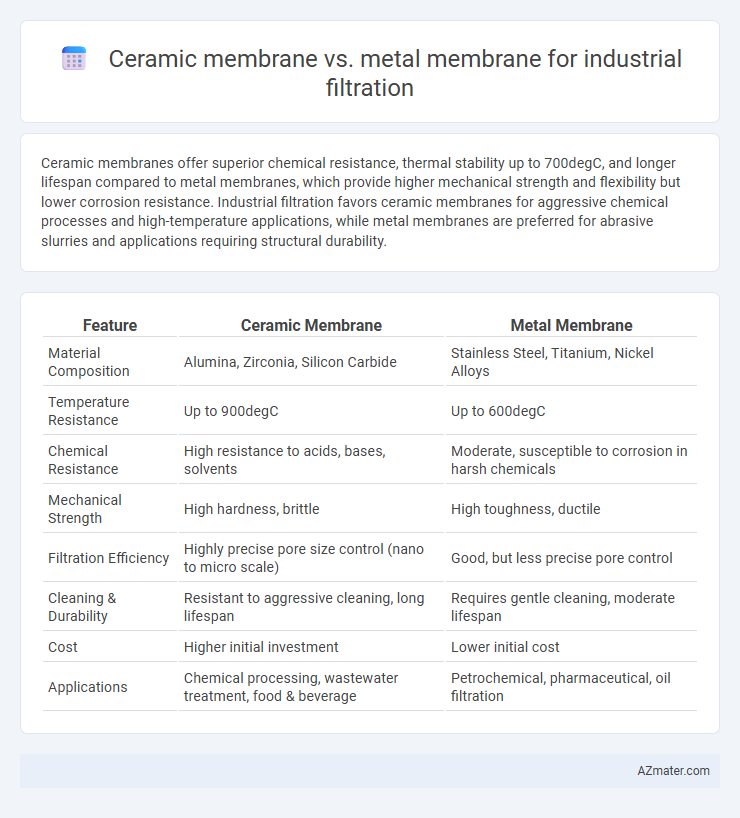Ceramic membranes offer superior chemical resistance, thermal stability up to 700degC, and longer lifespan compared to metal membranes, which provide higher mechanical strength and flexibility but lower corrosion resistance. Industrial filtration favors ceramic membranes for aggressive chemical processes and high-temperature applications, while metal membranes are preferred for abrasive slurries and applications requiring structural durability.
Table of Comparison
| Feature | Ceramic Membrane | Metal Membrane |
|---|---|---|
| Material Composition | Alumina, Zirconia, Silicon Carbide | Stainless Steel, Titanium, Nickel Alloys |
| Temperature Resistance | Up to 900degC | Up to 600degC |
| Chemical Resistance | High resistance to acids, bases, solvents | Moderate, susceptible to corrosion in harsh chemicals |
| Mechanical Strength | High hardness, brittle | High toughness, ductile |
| Filtration Efficiency | Highly precise pore size control (nano to micro scale) | Good, but less precise pore control |
| Cleaning & Durability | Resistant to aggressive cleaning, long lifespan | Requires gentle cleaning, moderate lifespan |
| Cost | Higher initial investment | Lower initial cost |
| Applications | Chemical processing, wastewater treatment, food & beverage | Petrochemical, pharmaceutical, oil filtration |
Introduction to Industrial Filtration Membranes
Industrial filtration membranes are critical for separating solids from liquids in various manufacturing processes, with ceramic and metal membranes being two primary types. Ceramic membranes offer high chemical and thermal stability, making them suitable for harsh environments and aggressive solvents. Metal membranes provide exceptional mechanical strength and resistance to fouling, ideal for high-pressure applications and long-term durability in challenging industrial settings.
Overview of Ceramic Membrane Technology
Ceramic membrane technology in industrial filtration offers exceptional chemical, thermal, and mechanical resistance, enabling efficient separation in harsh environments such as wastewater treatment and food processing. These membranes exhibit high permeability and selectivity due to their uniform pore size distribution, making them ideal for microfiltration, ultrafiltration, and nanofiltration applications. Compared to metal membranes, ceramic membranes provide superior durability and longer service life under aggressive conditions, reducing operational costs and downtime in industrial processes.
Overview of Metal Membrane Technology
Metal membrane technology for industrial filtration offers exceptional durability and chemical resistance, making it suitable for harsh operating environments such as high temperatures and corrosive fluids. These membranes typically use stainless steel, titanium, or other metal alloys, providing superior mechanical strength and long service life compared to ceramic membranes. Metal membranes enable efficient separation processes, including microfiltration and ultrafiltration, with high flux rates and easier cleanability.
Material Properties: Ceramic vs Metal Membranes
Ceramic membranes exhibit superior chemical resistance, high thermal stability, and robustness against harsh industrial conditions compared to metal membranes, which often face corrosion and wear issues. The inherent porosity and hardness of ceramic materials enable prolonged operational life and effective filtration of fine particles, making them ideal for aggressive environments. Metal membranes offer higher mechanical strength and flexibility but generally require protective coatings to enhance durability in corrosive settings, limiting their application scope relative to ceramics.
Filtration Performance and Efficiency Comparison
Ceramic membranes exhibit superior chemical and thermal stability, enabling high filtration performance in harsh industrial environments with particle retention efficiency exceeding 99%. Metal membranes offer enhanced mechanical strength and corrosion resistance, supporting continuous operation at high pressures while maintaining permeability rates suitable for oily and abrasive fluids. Both membranes provide efficient separation, but ceramic membranes typically achieve higher flux rates and longer operational lifespans, optimizing overall filtration efficiency in industrial applications.
Chemical and Thermal Resistance: Ceramic vs Metal
Ceramic membranes exhibit superior chemical resistance, withstanding aggressive acids, alkalis, and solvents without degradation, making them ideal for highly corrosive industrial filtration processes. Their thermal resistance extends to temperatures above 500degC, maintaining structural integrity and filtration efficiency under extreme heat. In contrast, metal membranes tolerate high temperatures but are more susceptible to chemical corrosion, particularly in acidic or oxidative environments, limiting their application where chemical stability is critical.
Durability and Lifespan in Industrial Applications
Ceramic membranes offer superior durability and a longer lifespan in industrial filtration due to their high resistance to chemical corrosion, thermal shock, and mechanical wear, making them ideal for harsh operating conditions. Metal membranes, while robust and capable of withstanding high pressures, often face corrosion challenges that can reduce their effective service life in aggressive environments. Industrial applications demanding prolonged filtration performance under extreme conditions typically favor ceramic membranes for their consistent durability and reduced replacement frequency.
Maintenance, Cleaning, and Fouling Resistance
Ceramic membranes exhibit superior fouling resistance due to their chemically inert and hydrophilic surfaces, allowing for extended operational cycles and reduced cleaning frequency compared to metal membranes. Maintenance of ceramic membranes is generally lower because they withstand aggressive cleaning agents and high-temperature backflushing, which effectively removes deposits without damaging the membrane structure. In contrast, metal membranes require more frequent maintenance and gentler cleaning protocols to prevent corrosion and degradation, limiting their lifespan and operational efficiency in harsh industrial filtration environments.
Cost Analysis: Installation and Operational Expenses
Ceramic membranes generally have higher initial installation costs compared to metal membranes due to advanced manufacturing processes and material prices. Operational expenses for ceramic membranes are often lower, benefiting from superior chemical resistance and longer lifespan, which reduce replacement frequency and maintenance. Metal membranes may incur increased operational costs linked to corrosion and frequent cleaning, impacting overall cost-effectiveness in industrial filtration applications.
Application Suitability and Industry-Specific Uses
Ceramic membranes excel in high-temperature and corrosive environments, making them ideal for chemical processing, pharmaceuticals, and wastewater treatment industries due to their chemical stability and thermal resistance. Metal membranes offer superior mechanical strength and durability, suited for heavy-duty applications such as oil and gas refining, food and beverage processing, and petrochemical filtration where resistance to fouling and mechanical stress is critical. Selection depends on application-specific requirements like operating temperature, chemical exposure, and mechanical load, ensuring optimal filtration performance and longevity.

Infographic: Ceramic membrane vs Metal membrane for Industrial filtration
 azmater.com
azmater.com